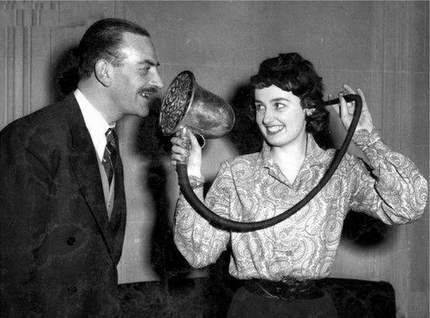One does not have to expend much energy or time searching for an advertised hearing aid coupon. They line the newspaper, pop up during Web surfing, arrive in the mail weekly and draw attention during wholesale shopping, but consumers are often misled about the products they are receiving through these proposed "deals."
So, how can a can a consumer discern which advertisements have their best interest as a priority?
Be cautious of time sensitive advertisements with the following terminology: coupon, discount, special promotion, demo sales, end of year pricing, inventory sale, 50 percent off, and buy one get one free. Market research has revealed the majority of publicized hearing aid sales including these terms are used as bait-and-switch marketing schemes to drive consumers into their office. Frequently, these catchphrases indicate that the salesman is issuing the consumer outdated device technology for a premium cost, as that model has already been replaced by a newer computer chip. Other times, the consumer is drawn in by the coupon, but then convinced that the deal is not applicable, for whatever reason, toward the device required by the patient's measured hearing loss.
Other hearing aid centers stock extensive amounts of hearing aids which are then "fashioned as a custom order" so that the consumer is quickly locked into a sale when they visit the office. Furthermore, these instruments may be obsolete and the consumer may not be offered another, more current or appropriate option.
Wholesale warehouses with a hearing aid sales center also promote hearing aids at a discounted rate, sometimes claiming the same name brands and technology offered by private-practice audiologists. However, hearing instruments available at these poorly operated centers commonly contain circuitry with significantly fewer capabilities or options. So, these proprietary models contain less-sophisticated technology than their private counterparts and can only be serviced by these warehouse stores.
Unfortunately, proprietary devices are frequently marketed with the same name as those sold by qualified audiologists, which could likely mislead an unsuspecting consumer researching their available options. Furthermore, the newest hearing aid technology is released to private practices. Therefore, devices in wholesale stores and franchise hearing aid centers may not be the most current technology available. So, when comparing devices from hearing aid dispensaries to those fit privately with an audiologist, consumers need to be aware that direct comparisons truly cannot be made.
How would you feel if you learned you had invested in a product that was out-of-date, obsolete or simplified, before being sold as "new" to you? Unfortunately, this kind of practice occurs every day in the world of high-pressure, discount-oriented hearing aid sales centers.
Current, quality hearing aid products are traditionally fit by audiologists who ensure that the products they fit are new, modern technology that is expertly selected and fit to best meet the patient's hearing loss and lifestyle needs. Extensive research is invested in these instruments to ensure that they meet the demands of our active patients, and the pricing includes the fitting, orientation and aural rehabilitation plan with a doctor of audiology. Therefore, rarely will services, batteries, accessories, warranties and hearing instruments be able to be so steeply discounted by an audiologist. More often, these extreme sales are listed at hearing aid sales centers with a primary goal of selling instruments instead of investing in optimizing your hearing health care.
When seeking care at a center offering a weekly promotional deal, discount or wholesale price, the consumer will likely be sacrificing optimal hearing care. Unfortunately, the cost of this mistake is rarely understood by patients and often purposely hidden by dispensaries and high-pressure sales centers. Audiologists are thoroughly educated, research-driven hearing health care specialists who seek to educate and advocate for their patients, treat hearing deficiencies and work to optimize their patients' quality of life through a comprehensive aural rehabilitation plan.
Consumers are encouraged to consider the value of the product and professional services provided as opposed to simply the bottom line cost of the hearing instruments
Johnson Audiology wants to empower patients to be proactive with their hearing health to make the best informed decision about who and where to seek audiological care. Regrettably, many hearing aid sales centers utilize misleading terminology in daily advertisements with the intention of selling to consumers. At Johnson Audiology, doctors of audiology are held to the highest ethical standards and are committed to delivering personalized aural rehabilitation services and products to best meet patients' individual hearing and tinnitus needs.
Noteworthy:
Be cautious of time sensitive advertisements with the following terminology: coupon, discount, special promotion, demo sales, end of year pricing, inventory sale, 50 percent off, and buy one get one free.
MORE INFORMATION
For more information about Johnson Audiology or to schedule a consultation, call the Chattanooga office at 423-710-1432 or the Hixson office at 423-713-5266 or visit johnsonaudiology.com.

